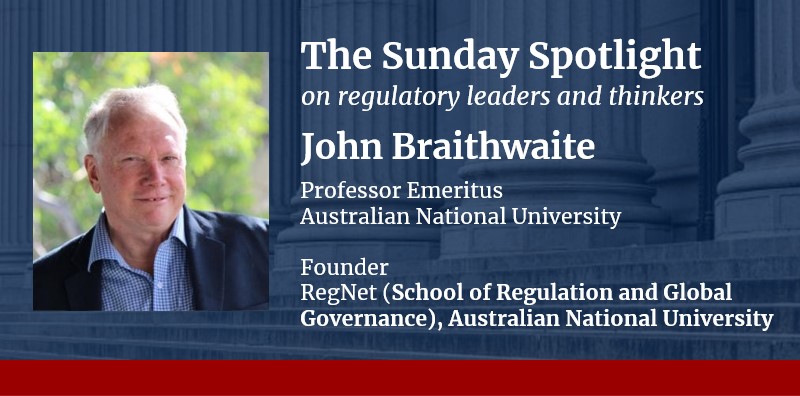
John Braithwaite discusses his research in regulation and criminology and ideas for future research.
In a recent conversation with The Regulatory Review, regulatory law scholar and criminologist John Braithwaite discusses the role of third parties in regulatory governance and regulation’s relationship with criminal law. Braithwaite also offers insight and advice about new research possibilities in the field of regulation, including the role for human deliberation in the face of increasing reliance on artificial intelligence for consequential decision-making.
Braithwaite has published prolifically on regulation, war, and crime. His research focuses on how effective regulation can reduce the amount of domination in the world. Braithwaite has explored the importance of third-party participation in regulation and the role of civil society organizations in constraining strong actors, such as negligent care homes. His most recent book, Simple Solutions to Complex Catastrophes, argues that a revived peace movement and responsive regulation can prevent global crises from cascading.
Braithwaite earned his Ph.D. in Sociology from the University of Queensland. He is Professor Emeritus at the Australian National University, where he founded the School of Regulation and Global Governance, or RegNet. He formerly served as a Commissioner of the Australian Competition and Consumer Commission and as a member of the Australian Prime Minister’s Economic Planning Advisory Council. He has been awarded the Stockholm Prize in Criminology and is the first non-British winner of the British Society of Criminology’s lifetime achievement award.
The Regulatory Review is pleased to share the following exchange with Professor Braithwaite.
The Regulatory Review: You have written about what you call the myth of deregulation. What is that myth? How does it relate to present-day discussions about regulation?
In my 2008 book, Regulatory Capitalism, I concluded that up to that time, there had been a long period of growth in the number of regulatory agencies globally, the number of regulatory bureaucrats, and the pages of regulatory law. In the United States, various works of Penn researchers led by Professor Cary Coglianese suggest that this has continued since. Corporate crime prosecutions, however, may have dropped off somewhat in favor of deferred prosecution agreements.
TRR: What is the relationship between regulation and crises—economic, ecological, military, or otherwise?
Crises increase demand for regulation and stimulate regulatory learning.
TRR: Should third parties play a role in the regulatory relationship between states and businesses? If so, what should their role be?
Without vibrant third-party participation that is being constantly reinvented, capture and corruption is the fate of regulatory institutions. Regulatory innovation is invented by third parties at times.
TRR: Can you highlight a time when a third party intervened in a regulatory relationship to make some aspect of society better?
The biggest one I can think of is leadership by coal mining unions in regulatory innovation and worker inspections of tunnels that reduced coal-mine fatalities more than a hundred-fold during the 20th century. I discuss this in my book, To Punish or To Persuade?
TRR: In addition to your work on regulation, you have an extensive background in criminology. Are regulations and criminal laws related? If so, how? Can regulators find better ways to prevent and respond to crime?
The frequency of criminal prosecutions appears to be a weak predictor of compliance, but when prosecutions motivate more deliberative regulatory practices lower in a regulatory pyramid, prosecutions make a critical contribution. The regulatory craft continues to be about getting the mix right between punishment and persuasion.
TRR: You have researched the regulatory approaches of many countries in the Global South, including Indonesia and Timor-Leste. Broadly speaking, how does regulation in the Global South differ from regulation in the Global North?
Sometimes regulation is more innovative in the Global South, but it tends to be poorly resourced, often afflicted by corruption.
TRR: What are some of the most important lessons from your body of scholarship and life’s work that you would want regulators anywhere to know?
Think about what bright-line rules are needed, but also deeply ponder what principles motivate those rules. Test yourself, and encourage independent testing, on whether you are improving on delivery of those principles.
TRR: And similarly, what lessons might you offer for new directions in the study of regulatory governance?
Randomized controlled trials are surprisingly thin in our field. That is an opportunity space for young scholars for testing key policy propositions. Another important issue deserving of new research: How do we sustain the virtues of regulation as a conversational craft as artificial intelligence (AI) diffuses? For example, AI greatly increased Israeli efficiency in detecting Hamas targets. Identification of targets reportedly increased to 100 new targets per day, compared to 50 per year with previous human intelligence methods. One way the Gaza war has become counterproductive is that the human part of the “human-AI team” was so overwhelmed by the speed of detection that the quality of conversations about human regulation of AI failed. Instead, humans kept up with the AI mostly by rubber-stamping its recommendations after seconds, rather than minutes or hours, of deliberation. Worse, there was a want of conversational regulation of patterns in the AI recommendations. One question that should be addressed in that deliberation is: Is it right that the AI does not lead us to targeting Hamas members in their tunnels, but keeps prompting us to target them during brief returns to their homes, often on special occasions when families come together to celebrate a child’s birthday with a rarely seen tunnel-dwelling relative?



